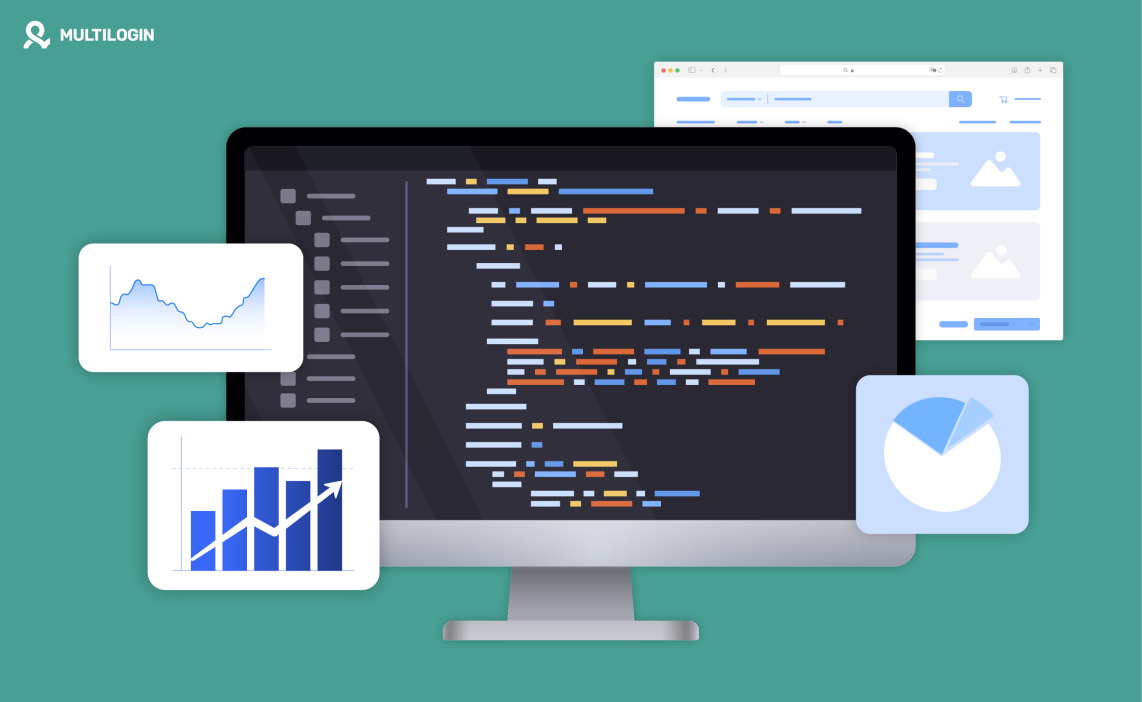There are many ways to connect with potential customers. One of them is web scraping which can help you enhance your marketing efforts and gain success.
Many businesses use various ways to gather information about customers as it leads to achieving their goals. Continue reading this article if you want to learn more about web scraping for lead generation and how it can help you to success.
What is Lead Generation?
Before we explain how web scraping helps with lead generation, let’s find out what the lead generation is.
Lead generation includes strategies businesses use to attract potential customers. These methods can be social media campaigns, email marketing or web scraping.
Web scraping is essential as it allows people to collect relevant information from various websites. The data companies seek for can be contact details, phone numbers, email addresses, company names and much more. The data that we want to collect is depending on our purposes and goals.
People find web scraping useful for many different reasons. It is important for data analysis, marketing research. After collecting the data, it is important to organize it. You can use different formats, such as spreadsheets.
Businesses can use the collected data for targeted marketing campaigns to achieve their goals and succeed. Learning strategies about web scraping for lead generation will be helpful to improve your efficiency.
How Web Scraping Helps with Lead Generation
Web Scraping is very helpful to enhance lead generation. Here are some of the reasons how it helps with lead generation:
1.Collecting Targeted Data
Scraping allows businesses to get the information about specific industries, competitors or customers from websites.
2.Contact Information Collection
Web scraping is essential to gather data about email addresses, phone numbers, social media profiles. This information can be used for lead generation. Companies can use these lists for marketing campaigns.
3.Market Analysis
Web scraping can be used for collecting information about competitor. Businesses can analyze their offerings and prices and use it for their advantage.
4.Staying Updated
Web scraping can be beneficial for lead generation as you can stay updated on new trends. It allows businesses to approach potential leads with relevant insights.
How to Start Web Scraping for Lead Generation
Now that you understand the importance of web scraping, follow this guide to see how web scraping works:
Step 1: Set Your Goals
Firstly, you must start with defining your purposes. You must clarify who your ideal customers are.
After you identify your target audience, you must think about what kind of data is needed to collect. It might include email addresses, phone numbers, company names. You must make sure that the information meets your needs and goals.
Step 2: Search for the Tools
You must search for the best tools you can use for web scraping. Collect information about them and see which one can be the most convenient for you. People often use the tools like Beautiful Soup, ParseHub, Scrapy and Octoparse.
You also must consider using browser extensions like Web Scraper and Data Miner as well.
Step 3: Identify Target Websites
Using relevant websites help you scale effectively. You must focus on the websites that are relevant to your customers.
You must make sure that you are using reputable ones to ensure that the collected data is accurate and reliable. Also keep in mind that sites you target must allow scraping (you can check this information by reviewing their terms of service).
Step 4: Start Scraping Process
You must monitor any errors and adjust your scraping workflow. Also, it is important to define how you will save the data you want to collect.
Step 5: Organize and Analyze Data
Staying organized is essential to success in web scrapping. Make sure that you remove duplicates and organize the data into a structured format. You can use tools like CSV, Excel or Database for this.
Analyze data, determine which leads fit your target profile best. Use the information to create personalized email campaigns.
Step 6: Track Results
Always monitor the effectiveness of web scrapping. Based on the results you can make adjustments to your scraping process.
4 Best Tools You Can Use for Web Scraping
People use different tools for web scraping. Here are some of the most popular platforms:
1.Beautiful Soup
Beautiful Soup is a Python library for parsing HTML and XML documents. It creates parse trees from page source codes, making it easy to navigate and search for data.
Pros:
- Easy to use for beginners;
- Works well with various parsers;
- Extensive resources available for troubleshooting and learning.
Cons:
- Can be slower compared to some other tools;
- Requires coding knowledge.
2.Scrapy
Scrapy is a powerful Python framework specifically designed for web scraping. It enables users to create spiders that crawl websites and extract data.
Pros:
- Handles large-scale scraping tasks;
- Built-in features like following links;
- Extensible.
Cons:
- Requires coding knowledge;
- Not user-friendly for beginners.
3.Octoparse
Octoparse is a no-code web scraping tool with a visual interface. It allows users to scrape data from websites.
Pros:
- No coding skills required;
- User-friendly interface;
- Offers pre-built templates for common scraping tasks.
Cons:
- Limited customization;
- Free version has limitations; advanced features require a subscription.
4.ParseHub
ParseHub is a no-code web scraping tool that also offers a visual interface. It can scrape data from both static and dynamic websites.
Pros:
- User-friendly interface;
- Capable of scraping data from websites that use JavaScript and AJAX;
- Can scrape multiple pages and handle pagination easily.
Cons:
- Free plan has limitations;
- Learning more advanced features can take time.
Choosing the right tool can be a game-changer in your journey. Try to be very cautious and choose tools that meet your needs the most.
Best Practices for Web Scraping
Web scraping for lead generation can be challenging. It requires exploring different methods to success and scale your business.
Here are some practices that will help you make your web scraping processes more efficient:
1.Choose the Right Tools
As we mentioned earlier, choosing the tools that align with your technical skills and goals is essential to succeed.
2.Automate Processes
Setting up automated scraping schedules to gather data regularly can help you manage processes better. Try to use different tools to avoid bans and enhance scraping efficiency.
3.Monitoring Data
From time to time, you must validate the data to ensure accuracy. Measure the effectiveness of your scraped data in lead generation efforts.
Keep an eye on protecting data and be mindful of how you handle personal information.
4.Stay Updated on Best Practices
Staying updated will help you to make necessary changes in your web scraping process. You must consider following industry trends in web scraping technologies, data privacy laws.
Participation in communities allow you to get information about different experiences. You can follow relevant social media channels, engage with online forums or groups to share knowledge and stay updated.
6 Common Web Scraping for Lead Generation Mistakes
1. Ignoring Legal and Ethical Guidelines
Before starting web scraping, you must check a website’s terms and conditions. Not checking can lead to legal issues or being banned from the site.
Also remember that you must comply with data protection regulations like GDPR.
2. Scraping Inaccurate Data
Sometimes people scrape from unqualified websites which can lead to low-quality leads. Not verifying the accuracy of collected data can result in incorrect information.
3. Overlooking Website Structure Changes
Broken Scrapers: Websites frequently change their layouts. Not updating your scraper can lead to broken scripts and missing data.
4. Not Using Rate Limiting
Sending too many requests in a short time can trigger IP bans or CAPTCHAs, disrupting your scraping efforts.
5. Using the Wrong Tools
Choosing a tool that doesn’t fit the complexity of the scraping task can hinder efficiency.
6. Not Staying Informed
Failing to keep up with changes in web scraping technologies, best practices, and regulations is harmful for your success.
How Multilogin Can Help with Web Scraping for Lead Generation
Anti-detect browsers can help people overcome the challenges of web scraping for lead generation. Multilogin allows users to create and manage multiple profiles.
This tool provides feature to avoid detection, so websites can no longer detect that multiple scraping operations are done from the same machine.
One of the challenges you might face when web scraping is getting banned. Multilogin creates unique fingerprints for each profile (IP address, user-agent, etc). This feature minimizes the risks of getting your accounts blocked or banned.
Unlike headless browsers that are easily detected as scraping bots, Multilogin mimics real Chrome and Firefox activity, preventing restriction by websites. Also keep in mind that all proxy types are seamlessly supported.
Multilogin’s user-friendly interface simplifies managing processes and makes web scraping more convenient. You do not need any extensive technical skills to use this anti-detect browser.
As you can see, using Multilogin can help you succeed web scraping for lead generation by making the process more efficient and less detectable.
Frequently Asked Questions About Web Scraping for Lead Generation
What tools can I use for web scraping?
There are many tools you can use for web scraping. Some of the most popular tools are Beautiful Soup, Scrapy, ParseHub and Octoparse.
It is important to consider your technical skills before choosing the tool you will use for web scraping.
What kind of data can I scrape?
The data you can scrape includes contact and company information, job titles and roles, social media profiles, demographic information, competitor insights, etc.
Can I automate the web scraping process?
Yes, you can automate the web scraping process. You can use scraping frameworks or no-code tools with scheduling features. Keep in mind that you can also use Multilogin to automate web scraping.
Conclusion
In conclusion, web scraping is a useful strategy for lead generation. Gathering relevant data can help you scale your business and be successful.
However, always remember the risks that comes with web scraping. Understanding and minimizing these risks is crucial for effective web scraping.



